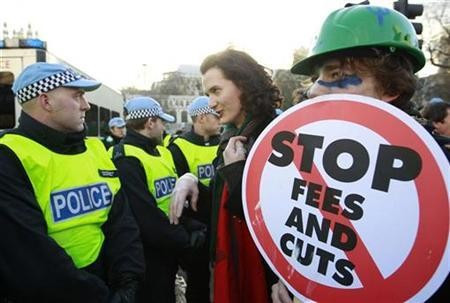Trebling Tuition Fees to Push October RPI Inflation up by 0.4%: RBS

Index-linked bondholders whose investments are tied to the UK Retail Price Index (RPI) measure of inflation will be impacted by the spiralling cost of university tuition fees, as the latest influx of students, the first group to be affected by the coalition government's trebling of the cap to £9,000, count the cost of their education.
Research from RBS, the British bank, predicts that the rising fees, which are taken into account when calculating RPI, will add around 0.4 percent to the headline figure in October.
"This is highly unlikely to have immediate ramifications for monetary policy - the MPC will look through the first-round effects of this 'administered' price rise - but does have implications for index-linked bond markets," said the RBS note.
RPI-linked bonds are often used as hedging tools against inflation rises. If inflation falls over the bond's life to maturity, then its value drops.
If inflation rises then so does the bond's coupon value. Markets price inflation-linked bonds on their expectations for future inflation.
The average cost of tuition fees are used when formulating the RPI figure. As not every university is charging fees up to the cap, the effect of the £9,000 figure some have slapped on their degrees is moderated.
Furthermore, because the new fees regime only applies to the first year of students the Office for National Statistics (ONS), which calculates inflation, is staggering the increases across roughly equally across the next three years.
RBS also notes that the fees rise only applies to England, whereas RPI is calculated across the whole of the UK "hence this will also tend to lower the reported percentage increase in the RPI tuition fee subindex".
"The phasing-in approach to tuition fees in the RPI data means that there will be further sizeable increases in October 2013 and October 2014," said the note.
"The magnitude of these increases is likely to diminish, reflecting the fact that a larger proportion of the student population will at that point be subject to the higher fees (roughly one-third in October 2013 and two-thirds in October 2014).
"These increases will further raise the level of RPI relative to baseline scenarios.
"There is clearly a huge degree of uncertainty around the precise scale of the rises that the RPI tuition fee data will show next year and beyond."
Shortly after the coalition government took office in May 2010, they slashed the higher education budget as part of the austerity programme to quell the deficit in public finances.
To help close the gap left in funding for universities, the cap on tuition fees was trebled to £9,000, sparking student protests across the country.
© Copyright IBTimes 2025. All rights reserved.






















